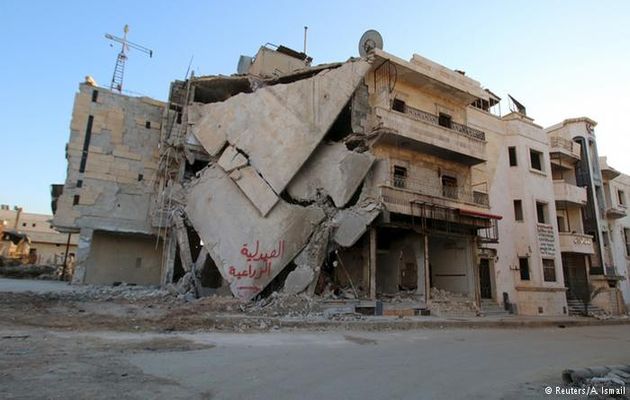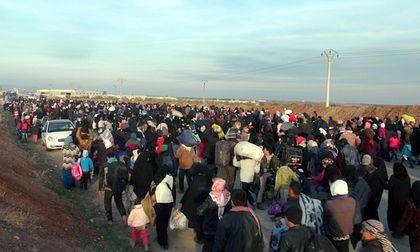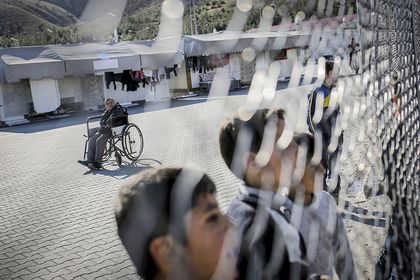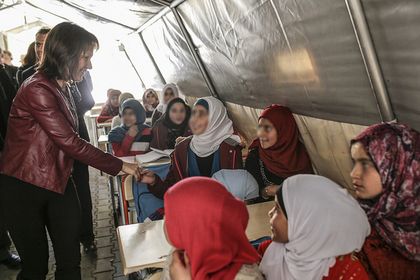Tackling the refugee crisis in Turkey and Greece
Thousands of Syrians have left Aleppo, where 500 have died in Russian strikes, seeking refuge in Turkey. Meanwhile, EU has given Athens one month to improve conditions for asylum seekers
BBC, EurActiv, Deutsche Welle · TURKEY | GREECE · 10 FEBRUARY 2016 · 17:40 CET

According to Rami Abdel Rahman, head of the Syrian Observatory for Human Rights: “So far 89 civilians, including 23 children, were killed in Russian strikes in northern Aleppo and the city of Aleppo since the attack started on February 1."
Rahman said more than 12 civilians were killed in the city of Aleppo after being caught in rebel gunfire. Islamic fighters suffered heavy casualties. Around 274 militants, including members of the al-Qaeda-linked al-Nusra Front and other Islamic groups were also killed. Around 143 regime soldiers, backed by Russia, lost their lives, Rahman said.
ALEPPO, THE CENTRE OF THE CONFLICT
Violence in Aleppo has forced tens of thousands of civilians to flee the region and seek refuge in Turkey. According to the United Nations, over 30,000 people were amassed at Syria's Turkish border over the weekend.
Aleppo, once Syria's commercial and industrial hub, has been roughly divided since 2012, with the government controlling the western half and rebel factions holding the east.
Officials also warned of a humanitarian crisis in Aleppo, saying hundreds of thousands of people could be in dire need of aid and necessary supplies as Syrian regime troops and allies cut off rebel supply routes.
2,5 MILLION REFUGEES IN FIVE YEARS
“Turkey needs as a matter of urgency to make significant progress in preventing irregular departures of migrants and refugees from its territory to the EU, notably by stepping up land based operations”, the commission says, adding that the total number of arrivals remains high for winter.
The report acknowledges some of the measures taken by the Turkish authorities, such as the introduction of visa obligations for Syrians arriving from a third country, sharply reducing arrivals from Lebanon and Jordan, where hundreds of thousands fled the war in Syria. Turkish authorities also gave access to the labour market to Syrians.
Commission vice-president Frans Timmermans, the main negotiator with Ankara from the bloc's executive, in a press released welcomed those steps. Turkey has accepted 2.5 million refugees since the uprising against President Bashar al-Assad almost five years ago.

SYRIA INSISTS ON ALEPPO
Syria for its part has insisted that it will continue with its objective of securing the border with Turkey and recapturing Aleppo, a top adviser to President Bashar al-Assad told the Reuters news agency on Tuesday.
The UN Office for the Co-ordination for Humanitarian Affairs (OCHA) commented that such a move might leave up to 300,000 people cut off from humanitarian aid, unless access could be negotiated.
More than 260,000 people have been killed and several million displaced since 2011, when anti-government protests led to violent conflict between the regime, rebels and militants of the so called Islamic State.
MEP´S VISIT TURKEY
MEPs have called on EU countries to deliver on the €3 billion refugee facility for Turkey. As the EU searches for the best approach to tackle the crisis, two delegations from the civil liberties and budgets committees travel to Turkey this week to assess the situation on the ground.
The delegation will visit refugee support projects and meet NGOs and other partners to assess the situation on the ground.
A delegation from the budget committee will also visit Turkey this week to discuss the application of EU funds with authorities there and investigate the use of EU support measures for refugees from Syria and Iraq.
EUROPEAN COMMISSION EVALUATION
Meanwhile, the European Commission has reported today on progress made on measures to tackle the refugee and migration crisis in Italy, Greece and along the Western Balkans Route.
The Commission has evaluated the hotspot (special centres for registering migrants )system and relocation scheme in Italy and Greece and the measures taken to implement the commitments in the Statement agreed at the Western Balkans Route Leaders' Meeting in October 2015.

In Italy, the foreseen rollout of six identified hotspot areas by the Italian authorities (in Lampedusa, Pozzallo, Porto Empedocle/Villa Sikania, Trapani, Augusta and Taranto) has also been slow, due in part to the need to build them from scratch and shortcomings in infrastructure, staffing and coordination.
Two hotspots are fully operational (Lampedusa and Pozzallo), and Trapani will be fully operational when final refurbishment works are completed.
EUROPE GIVES GREECE ONE MONTH
Regarding Greece, the rollout of the five hotspots identified in the Aegean islands (Lesvos, Chios, Samos, Leros and Kos) has been slow. Only Lesvos is currently fully operational.
European Union authorities have given Athens one month to improve conditions for asylum seekers in the hope of eventually sending more refugees back to Greece.
The European commission has issued Athens with a list of instructions to bring Greece into line with EU norms on refugee policy, including improving living conditions for asylum seekers and overhauling judicial procedures so people denied leave to remain have the right to appeal.
Dimitris Avramopoulos, the European commissioner in charge of migration policy, has said it was time to bring Greece back into the EU’s Dublin system, although he added that “migratory pressures” on Greece needed to be taken into account “not to put more burden” on the country.
BALKANS SITUATION
The European group has informed that weekly meetings organised by the Commission have taken place to monitor the 17-point plan agreed at the Leaders' Meeting hosted by President Juncker on refugee flows along the Western Balkans route.

A comprehensive exchange between police chiefs on policies and practices at the borders is now taking place and communication and cooperation between border authorities has been improved.
Restoring orderly management of borders on the Eastern Mediterranean/Western Balkans route is the most pressing priority for the European Union today.
REDUCING AUSTRIA RELOCATIONS
Additionally, according to Reuters agency, the European Commission has recommend suspending a third of the relocations of migrants to Austria as requested last year by Vienna.
This decision would be an attempt to keep Vienna on board for a pan-European approach to the crisis, rather than have countries implementing their measures unilaterally.
Vienna, which originally adopted the same "open-door" policy for refugees as Germany, recently said it wants to speed up deportations. It strengthened border controls and introduced an annual ceiling on the number of migrants it would receive as it seeks to reduce overall immigration.
Vienna said the cap on refugees should be a "wake-up call" for Brussels.
REFUGEES SUMMIT
EU leaders will discuss Europe’s response to the refugee crisis at a summit on 18-19 February, but are not expected to take decisions. At the summit, EU countries will also be confronted with their failure to make a relocation scheme work.
Although the EU adopted a plan calling for 160,000 asylum seekers to be resettled from Italy and Greece to other EU countries, the latest figures show that only 497 people have been moved.
Published in: Evangelical Focus - europe - Tackling the refugee crisis in Turkey and Greece
